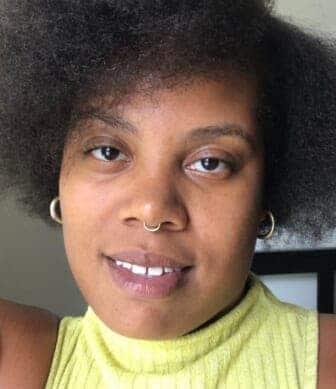Breastfeeding can be challenging — this Black lactation specialist has advice on how to prevail
Ahead of Black Breastfeeding Week, theGrio discusses the challenges and benefits with Black breastfeeding specialist Sterling Grey-Simmons.
Breastfeeding is natural — but, as Keke Palmer recently put it, for many, it is “not instinctual.”
The actress, who gave birth to son Leodis on Feb. 27, has been open about her journey with breastfeeding. She told People magazine, “It’s been a doozy,” and in a recent cover story for Essence‘s fashion issue, she explained that despite wanting to give up at times, it’s been “very empowering because it was so difficult.”
Palmer prevailed with the help of a professional lactation specialist. She admitted to People she didn’t know where to begin when searching for help but ultimately found the right source.
“Shout out to all the lactation consultants because mine really, really made the difference for me,” Palmer told People.

Palmer’s experience is one shared by many. According to the Centers for Disease Control and Prevention, 60% of nursing parents stop breastfeeding sooner than they initially intended, and Black babies are consistently breastfed the least. The low breastfeeding rates in this country across the board and the lack of societal acceptance have led to the creation of both National Breastfeeding Month, commemorated each August, and Black Breastfeeding Week, celebrated Aug. 25 through Aug. 28. While there have been some improvements to the rates over the years, many still give up on the task out of frustration and reach for the bottle.
“There’s such a stigma associated with [breastfeeding],” Sterling Grey-Simmons, a certified lactation specialist based in Atlanta, told theGrio. “Some people associate it with slavery because there were wet nurses and those types of things.”
She added that on the heels of slavery during the Jim Crow era, manufacturers began marketing formula to Black families as an upper-class luxury.
“They marketed it to them by saying only poor Black women breastfed their babies. If you could afford formula, that would make you a higher-class person. I think that a lot of that is still ingrained in the culture,” she said, adding that Black families are offered formula at higher rates.
Beyond stigma, Grey-Simmons said lifestyle and work can get in the way of nursing. Many new parents must return to work within weeks of giving birth, preventing them from bonding effectively with their new baby or generating enough breast milk. And then there’s knowledge and support.
“It all comes down to education and support,” Grey-Simmons said, adding that it’s not just getting the education but when it’s received that could make a difference. She recommends parents begin learning about breastfeeding before the baby is born.
“It’s a lot easier to learn about breastfeeding before you have a crying baby who you’re trying to figure out how to latch on to your nipples and you’re leaking, and you’re sleep deprived, and you’re bleeding,” she said.
Grey-Simmons teaches breastfeeding prenatally and said she urges parents to begin their search for lactation specialists in their area before they give birth to avoid scrambling post-birth like Palmer and others have had to do. She also suggests it isn’t just the nursing parent who invests in the knowledge.
“When I’m teaching a breastfeeding class, I want you to invite your partner; I want you to invite your mom; I want you to invite your best friend. Whoever is gonna be there with you most of the days,” she said.
Grey-Simmons said inviting someone else along gives the pregnant person another set of ears and eyes during the lesson, picking up on things they may miss. During late-night nursing struggles or any other time, having someone else on hand who can accurately help with the nursing process will be invaluable support.
Learning about nursing and baby hunger cues before birth better equips parents overall. First-time nursing parents can be confronted with an array of unexpected developments when nursing a baby. Grey-Simmons said they can experience anything from cluster-feeding, when the baby eats several times within a certain time frame versus throughout the day, to overproducing milk, all of which a certified lactation specialist can prep families for.
Getting the hang of breastfeeding isn’t just a matter of preference; Grey-Simmons explained breast milk “is the gift that keeps giving.” According to the CDC, breastfeeding can protect against both short and long-term illnesses as breast milk adapts to the infant’s needs. Breastfed babies are less likely to develop allergies, diabetes, eczema, ear infections, stomach bugs, and the like. The benefits go both ways; the CDC also reports that parents who nurse can decrease their risk of developing type-2 diabetes, high blood pressure, and even some cancers, including breast cancer.
“[Breastfed babies] tend to be calmer because they’re usually comforted and content right there by their parents,” Grey-Simmons added.
While the benefits abound, the stigma and lack of common knowledge continue. Grey-Simmons said she got into her work line to answer her needs. Twelve years ago, when she had her first child, Grey-Simmons became what she calls a “first-generation breastfeeder.”
“I was the first one on both sides of my family that I knew wanted to breastfeed. When I chose to breastfeed my oldest, everybody was looking at me like I was crazy. They were like, ‘That’s nasty. Why would you want that baby sucking on you all the time?’ Zero support and just lots of backlash,” she said.
Grey-Simmons remembers being unable to pick up the phone and call her mom or grandmother for advice on nursing. She recalled not being able to find help outside of the overwhelmed hospital.
“I just realized that there was a gap that needed to be filled,” she said.
She added, “I think it’s important to let people know that they can have access to breastfeeding support outside of the hospital setting.”
Grey-Simmons said it’s important for nursing parents to find the right resources and accurate sources of information — and advises taking uncertified social media influencers’ advice with a grain of salt. She also noted that what’s healthy in terms of milk production for one baby and parent may not be healthy for another.
For any first-time nursing parents out there, Grey-Simmons offers assurance. “It definitely gets easier,” she said. Reach out to support the first time you feel like there’s a problem.” For more seasoned nursing veterans, Grey-Simmons advises they “Understand that each journey is different. Every baby is different. So just because you breastfed the first two and didn’t have an incident, now you have a problem with the third, this is OK. Everybody’s different.”
As for society at large, Grey-Simmons hopes breastfeeding can become more normalized. Ideally, that includes employers designating nursing rooms with lockers and refrigerators only nursing parents can access. Family members and friends can also be more supportive and accepting, especially when a nursing parent opens up about challenges. Push them toward finding the right support rather than throwing in the towel.
She said, “Normalize breastfeeding so Mama doesn’t feel like she has to be worried about what people are going to say or how she’s going to be received.”

Kay Wicker is a lifestyle writer for theGrio covering health, wellness, travel, beauty, fashion, and the myriad ways Black people live and enjoy their lives. She has previously created content for magazines, newspapers, and digital brands.
TheGrio is FREE on your TV via Apple TV, Amazon Fire, Roku, and Android TV. TheGrio’s Black Podcast Network is free too. Download theGrio mobile apps today! Listen to ‘Writing Black’ with Maiysha Kai.


